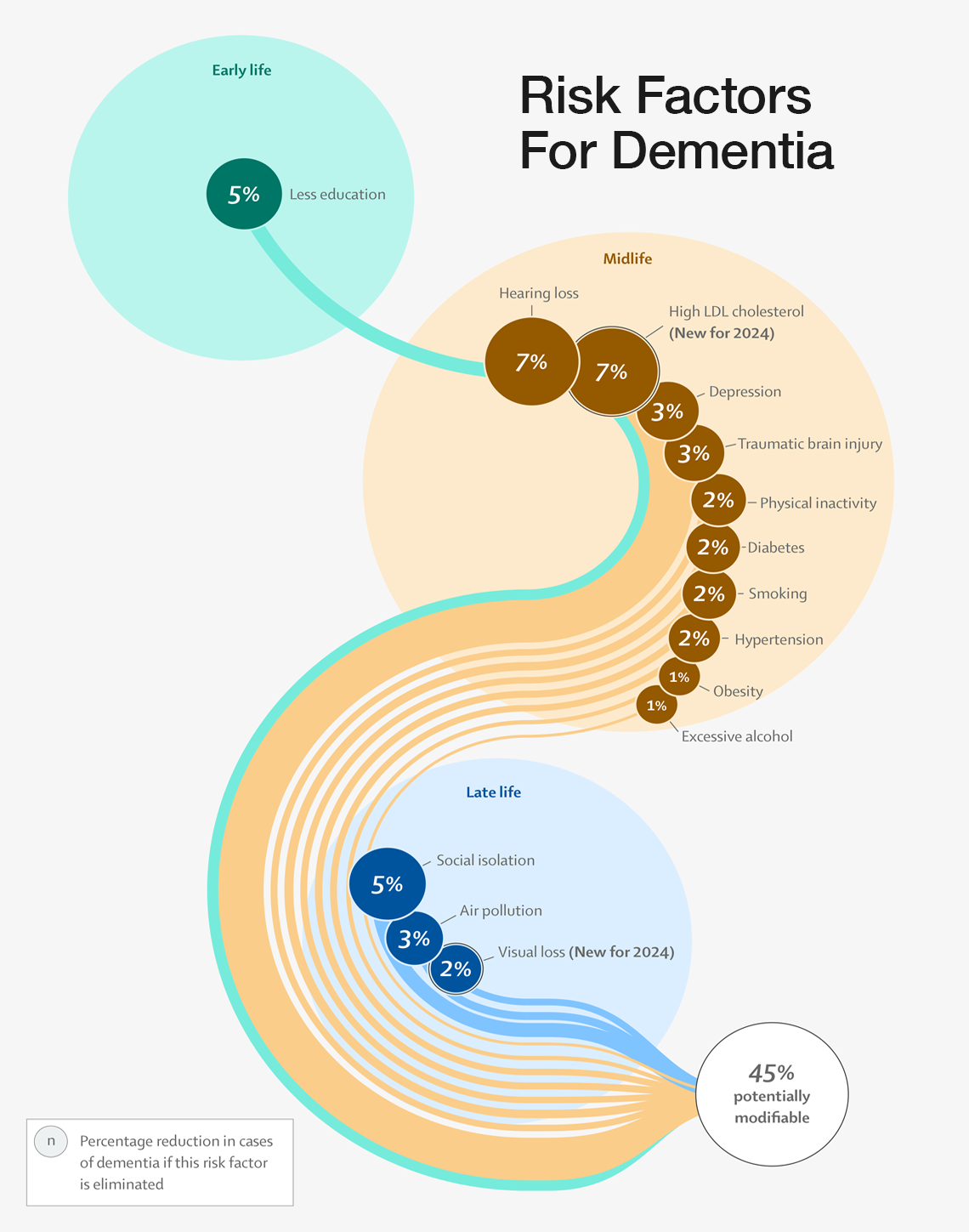Now there are 14 actions to take to protect your brain, some easier than others

A group of top researchers has just introduced two new methods to help reduce dementia risk. If you can adopt these measures, along with a dozen other strategies, many cases of dementia could be delayed or even prevented. These factors contribute to nearly half of all dementia cases.
In 2017, the Lancet Commission on Dementia Prevention, Intervention, and Care revealed that making specific lifestyle changes could significantly reduce your risk of dementia. This includes maintaining a healthy diet, exercising regularly, reducing alcohol intake, and increasing social interactions. Their findings were backed by substantial evidence.
The Commission’s latest report, released this July, identifies 14 modifiable risk factors—actions you can take to lower your risk. The new additions are untreated vision loss and high LDL cholesterol.
Here’s the list of 14 modifiable risk factors and how you can manage them to protect your brain.

1. Untreated Vision Loss: Get Your Annual Eye Exams
The newly added risk factor, untreated vision loss, can lead to cognitive impairment. Proper vision is crucial for brain health because the brain requires sensory input to maintain connections. Correcting common issues like cataracts and diabetic retinopathy can significantly reduce your risk.
2. Hearing Loss: Use Hearing Aids if Needed
Hearing loss is considered the most significant modifiable risk for dementia according to the Lancet Commission. Using hearing aids not only stimulates the brain but also helps maintain social interactions—both crucial for cognitive health.
3. Obesity: Maintain a Healthy Weight
Obesity is linked to other risk factors like type 2 diabetes, which impacts how the brain uses glucose. Eating a balanced diet high in fruits and vegetables can help manage weight, lower LDL cholesterol, and reduce the risk of diabetes and high blood pressure.
4. Diabetes: Control Your Blood Sugar Levels
Type 2 diabetes, which usually develops later in life, leads to chronically high blood sugar levels that can damage various organs, including the brain. Proper management of diabetes can help reduce your dementia risk.
5. High LDL Cholesterol: Consult Your Doctor
High LDL cholesterol levels increase the risk of strokes and Alzheimer’s disease. Lifestyle changes and statins can help manage cholesterol levels, reducing your risk of dementia.
6. Hypertension: Keep Your Blood Pressure in Check
High blood pressure in midlife significantly increases the risk of Alzheimer’s and vascular dementia. Regular exercise, a healthy diet, and possibly medication can help you manage hypertension effectively.
7. Physical Inactivity: Exercise Regularly
Regular exercise benefits almost every aspect of health, including brain health. Moderate-to-vigorous exercise can improve blood flow to the brain and help maintain cognitive function.
8. Smoking: Quit Smoking
Smoking increases the risk of heart disease, stroke, lung cancer, and dementia. It’s never too late to quit; even long-time smokers can reduce their dementia risk by quitting.
9. Lack of Education: Stimulate Your Brain
Lifelong learning is key. Take on new challenges like learning a language or picking up a new instrument to keep your brain sharp.
10. Social Isolation: Stay Connected
Social isolation can significantly increase dementia risk. Engaging in social activities, whether in-person or virtual, can help keep your brain active.
11. Excessive Alcohol Consumption: Drink Less
Cutting back on alcohol can reduce the risk of obesity, depression, and hypertension—factors that contribute to dementia.
12. Depression: Seek Effective Treatment
Treating depression can reduce the risk of dementia at any age. Effective treatments are available and worth exploring.
13. Head Injury: Prevent Falls
Preventing head injuries, especially from falls, is crucial for older adults. Strengthen your core, work on your balance, and wear a helmet when biking.
14. Air Pollution: Limit Exposure
Air pollution is a challenging risk factor to manage, but you can take steps like staying indoors on days with poor air quality and using air filters.
By addressing these 14 risk factors, you can significantly lower your chances of developing dementia and enjoy a healthier, more vibrant life.




